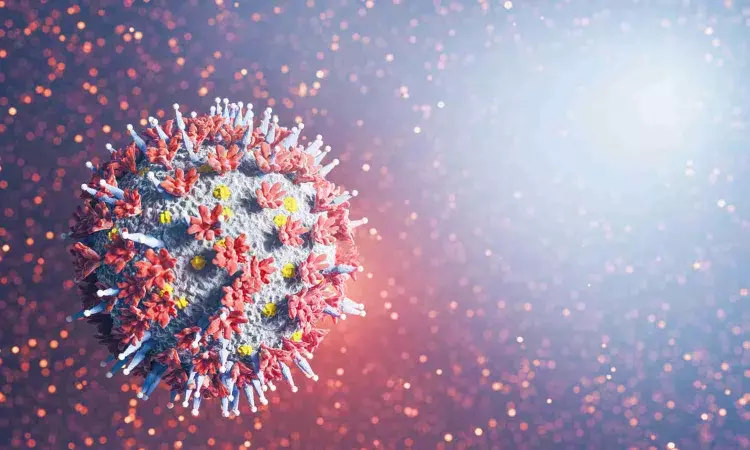- Home
- Medical news & Guidelines
- Anesthesiology
- Cardiology and CTVS
- Critical Care
- Dentistry
- Dermatology
- Diabetes and Endocrinology
- ENT
- Gastroenterology
- Medicine
- Nephrology
- Neurology
- Obstretics-Gynaecology
- Oncology
- Ophthalmology
- Orthopaedics
- Pediatrics-Neonatology
- Psychiatry
- Pulmonology
- Radiology
- Surgery
- Urology
- Laboratory Medicine
- Diet
- Nursing
- Paramedical
- Physiotherapy
- Health news
- Fact Check
- Bone Health Fact Check
- Brain Health Fact Check
- Cancer Related Fact Check
- Child Care Fact Check
- Dental and oral health fact check
- Diabetes and metabolic health fact check
- Diet and Nutrition Fact Check
- Eye and ENT Care Fact Check
- Fitness fact check
- Gut health fact check
- Heart health fact check
- Kidney health fact check
- Medical education fact check
- Men's health fact check
- Respiratory fact check
- Skin and hair care fact check
- Vaccine and Immunization fact check
- Women's health fact check
- AYUSH
- State News
- Andaman and Nicobar Islands
- Andhra Pradesh
- Arunachal Pradesh
- Assam
- Bihar
- Chandigarh
- Chattisgarh
- Dadra and Nagar Haveli
- Daman and Diu
- Delhi
- Goa
- Gujarat
- Haryana
- Himachal Pradesh
- Jammu & Kashmir
- Jharkhand
- Karnataka
- Kerala
- Ladakh
- Lakshadweep
- Madhya Pradesh
- Maharashtra
- Manipur
- Meghalaya
- Mizoram
- Nagaland
- Odisha
- Puducherry
- Punjab
- Rajasthan
- Sikkim
- Tamil Nadu
- Telangana
- Tripura
- Uttar Pradesh
- Uttrakhand
- West Bengal
- Medical Education
- Industry
lower pulmonary gas exchange in Long COVID patients associated with impaired cognitive function: Study

In patients with long COVID, lower pulmonary gas exchange may be associated with impaired cognitive function, according to a study being presented next week at the annual meeting of the Radiological Society of North America (RSNA).
According to the National Center for Health Statistics, approximately 17.6% of adults in the U.S. have experienced a post-COVID condition commonly referred to as long COVID. People with long COVID may exhibit a wide variety of symptoms, including difficulty concentrating (“brain fog”), change in sense of smell or taste, fatigue, joint or muscle pain, dyspnea (shortness of breath), digestive symptoms, and more. These symptoms may persist for weeks, months, or even years after COVID-19 infection.
Researchers from the University of Iowa in Iowa City set out to assess associations between pulmonary MRI gas exchange, structural and functional brain MRI, and cognition in long COVID patients. In pulmonary gas exchange, oxygen moves from the lungs to the bloodstream, while carbon dioxide moves from the bloodstream to the lungs.
“This is the first time that MRI has been used to jointly assess lung and brain function to investigate their relationship in long COVID,” said the study’s lead author Keegan Staab, B.S., graduate research assistant in the Department of Radiology at the University of Iowa in Iowa City. “This research is new in that it combines multiple unique imaging types to study a multiorgan relationship in a disease population.”
Senior study author Sean B. Fain, Ph.D., professor and vice chair for research in the Department of Radiology at the University of Iowa, added, “If these findings can be generalized to the long COVID population, the study suggests that there may be a causative relationship between cognitive dysfunction and lung dysfunction, suggesting a potential treatment strategy using methods that target improved gas exchange.”
For the study, 10 female and 2 male patients (median age: 59 years) who had persistent dyspnea and/or fatigue following the resolution of acute COVID-19 infection were recruited from a post-COVID-19 clinic. Hyperpolarized Xe pulmonary MRI, structural and functional brain MRI, pulmonary function tests and cognitive tests were acquired.
“129Xe MRI allows for advanced measurements of ventilation and gas exchange,” Staab said. “The literature also indicates that 129Xe may be more sensitive to pulmonary injury compared to standard breathing tests, making it better suited to study long COVID in which patients typically have normal breathing tests.”
Perceived cognitive difficulties were measured using Patient-Reported Outcomes Measurement Information System, and objective cognitive performance was assessed using the National Institutes of Health Toolbox V3 Cognition Battery.
“There was a range of cognitive difficulties among the patients in the study,” Staab said. “Some were mild and indicated slight dysfunction, while others were more serious and indicated that some patients have slow thinking and trouble concentrating several times per day.”
The results showed that lower pulmonary gas exchange may be associated with cognitive dysfunction, as well as lower gray matter and white matter volumes in patients with long COVID. In addition, the researchers observed significant relationships suggesting that increased cerebral blood flow is associated with decreased gas exchange in long COVID patients.
Staab said larger studies are needed to investigate the association between gas exchange and cerebral blood flow in long COVID.
“This relationship could be a compensatory mechanism where lower lung function is compensated by higher cardiac output and higher brain perfusion,” he said. “It’s also a possibility that the disease mechanism that impairs pulmonary gas exchange also leads to higher brain perfusion through downstream vascular injury in both lung and brain.”
Based on the findings of this study, gas exchange abnormalities may help identify long COVID patients who require additional treatment or long-term management.
Reference:
Long COVID brain fog linked to lung function, Radiological Society of North America, Meeting: 110th Scientific Assembly and Annual Meeting of the Radiological Society of North America.
Dr Kamal Kant Kohli-MBBS, DTCD- a chest specialist with more than 30 years of practice and a flair for writing clinical articles, Dr Kamal Kant Kohli joined Medical Dialogues as a Chief Editor of Medical News. Besides writing articles, as an editor, he proofreads and verifies all the medical content published on Medical Dialogues including those coming from journals, studies,medical conferences,guidelines etc. Email: drkohli@medicaldialogues.in. Contact no. 011-43720751


